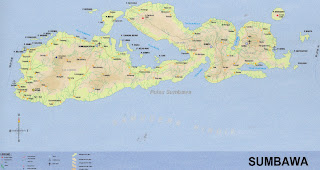Sumbawa is an Indonesian island, located in the middle of the Lesser Sunda Islands chain, with Lombok to the west, Flores to the east, and Sumba further to the southeast. It is in the province of West Nusa Tenggara.
Sumbawa is 15,448 km2 or 5,965 sq mi (three times the size of Lombok) with a current population of around 1.33 million. It marks the boundary between the islands to the west, which were influenced by religion and culture spreading from India, and the region to the east that was not so influenced. In particular this applies to both Hinduism and Islam.
Islam was introduced via the Makassarese of Sulawesi.
Sumbawa has historically had two major linguistic groups who spoke languages that were unintelligible to each other. One group centered in the western side of the island speaks Basa Semawa (Indonesian: Bahasa Sumbawa) which is similar to the Sasak language from Lombok; the second group in the east speaks Nggahi Mbojo (Bahasa Bima). The kingdoms located in Sumbawa Besar and Bima were the two focal points of Sumbawa. This division of the island into two parts remains today; Sumbawa Besar and Bima are the two largest towns on the island, and are the centers of distinct cultural groups that share the island.
Sumbawa has historically had two major linguistic groups who spoke languages that were unintelligible to each other. One group centered in the western side of the island speaks Basa Semawa (Indonesian: Bahasa Sumbawa) which is similar to the Sasak language from Lombok; the second group in the east speaks Nggahi Mbojo (Bahasa Bima). The kingdoms located in Sumbawa Besar and Bima were the two focal points of Sumbawa. This division of the island into two parts remains today; Sumbawa Besar and Bima are the two largest towns on the island, and are the centers of distinct cultural groups that share the island.
The population of the island is 1.33 million in the in decennial 2010 Census, 29.58% of the population of the entire province with 4.5 million people. Due to lack of work opportunities on the island and its frequent drought conditions (unlike wet Bali), many people on the island seek work in the Middle East as laborers or domestic servants, some 500,000 workers, or over 10% of the provincial population, have left the country from West Nusa Tenggara province to work overseas





























0 comments:
Post a Comment